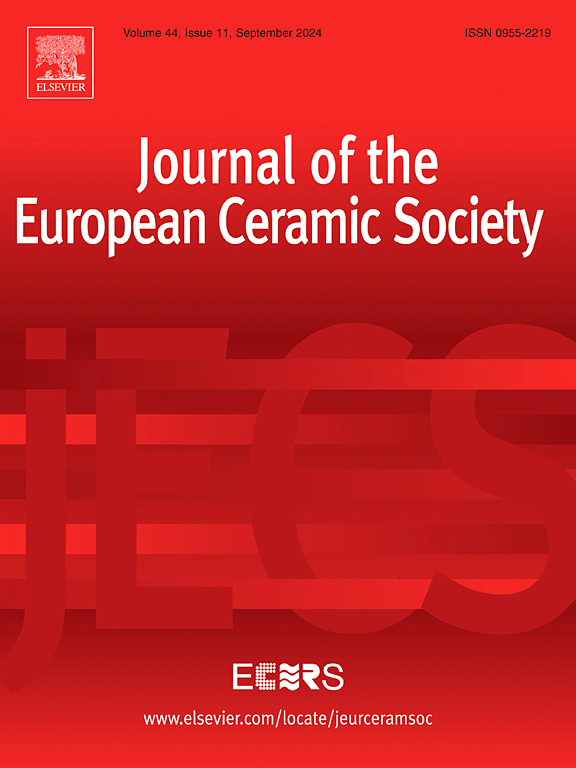异质Ta和Ga取代的LLZO固态电解质共烧结过程中的镓离子迁移
IF 5.8
2区 材料科学
Q1 MATERIALS SCIENCE, CERAMICS
Journal of The European Ceramic Society
Pub Date : 2024-09-20
DOI:10.1016/j.jeurceramsoc.2024.116936
引用次数: 0
摘要
Li7La3Zr2O12(LLZO)具有高离子电导率和安全特性,是下一代锂固态电池(SSB)的理想固态电解质。只有立方 LLZO 相才具有足够的离子导电性,而这种导电性可通过 Ta 或 Ga 等元素的替代而得到稳定。Ga 取代的 LLZO 离子电导率最高,但对金属锂阳极不稳定,而 Ta 取代的 LLZO 电导率稍低,但对锂阳极具有出色的还原稳定性。将 LLZO:Ga 作为锂阳极的阴极溶质和 LLZO:Ta 作为锂阳极的陶瓷分离剂相结合,将显著提高 SSB 的性能,但这两种材料的加工参数不同。在这项工作中,研究了 LLZO:Ga|LLZO:Ta 组份共烧结的可能性,同时改变了 LLZO:Ta 相的锂含量,并将结果与纯参考值进行了比较。实验结果表明,在共烧结 LLZO:Ga|LLZO:Ta 时,烧结活性、次生相形成、Ta 离子和 Ga 离子扩散都发生了变化,离子导电率也发生了变化。本文章由计算机程序翻译,如有差异,请以英文原文为准。
Ga-ion migration during co-sintering of heterogeneous Ta- and Ga-substituted LLZO solid-state electrolytes
Li7La3Zr2O12 (LLZO) is an attractive solid-state electrolyte for next-generation lithium solid-state batteries (SSB) because of its high ionic conductivity, and safety properties. Only the cubic LLZO phase has sufficient ionic conductivity, which is stabilized by substitution with elements like Ta or Ga. Ga-substituted LLZO has the highest ionic conductivity but is not stable towards metallic Li anodes, while Ta-substituted LLZO has a slightly lower conductivity but excellent reduction stability towards Li anodes. The combination of LLZO:Ga as a catholyte and LLZO:Ta as a ceramic separator for Li anodes would significantly enhance the performance of SSBs, but both materials have different processing parameters. In this work, the possibility of co-sintering LLZO:Ga|LLZO:Ta components is investigated with varying Li-excess of the LLZO:Ta phase, while the results are compared with pure references. The experiments showed a changed sintering activity, secondary phase formation, Ta- and Ga-ion diffusion, and a changed ionic conductivity when co-sintering LLZO:Ga|LLZO:Ta.
求助全文
通过发布文献求助,成功后即可免费获取论文全文。
去求助
来源期刊

Journal of The European Ceramic Society
工程技术-材料科学:硅酸盐
CiteScore
10.70
自引率
12.30%
发文量
863
审稿时长
35 days
期刊介绍:
The Journal of the European Ceramic Society publishes the results of original research and reviews relating to ceramic materials. Papers of either an experimental or theoretical character will be welcomed on a fully international basis. The emphasis is on novel generic science concerning the relationships between processing, microstructure and properties of polycrystalline ceramics consolidated at high temperature. Papers may relate to any of the conventional categories of ceramic: structural, functional, traditional or composite. The central objective is to sustain a high standard of research quality by means of appropriate reviewing procedures.
 求助内容:
求助内容: 应助结果提醒方式:
应助结果提醒方式:


